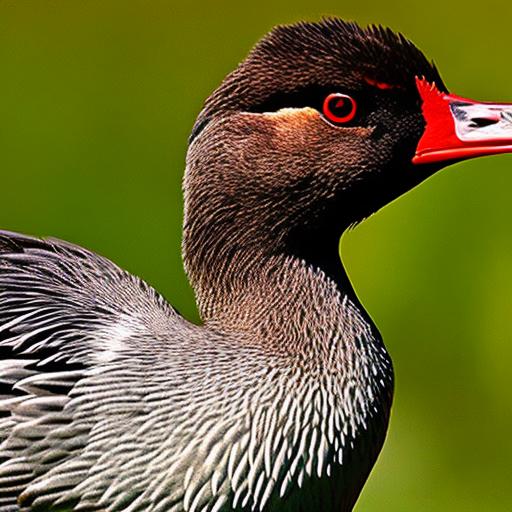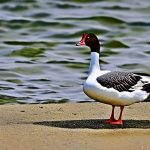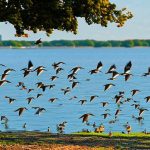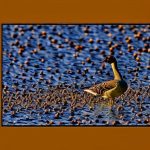Geese infestation is a common problem in many areas, especially near bodies of water. While geese are beautiful creatures, their presence can cause a range of issues, from property damage to health hazards. Finding humane solutions to control the geese population is crucial to maintaining a balance between human needs and wildlife preservation.
Key Takeaways
- Geese are social animals that prefer open spaces near water and grassy areas.
- Natural deterrents for geese include planting certain types of vegetation and using dogs to patrol the area.
- Physical barriers like fences and netting can prevent geese from accessing certain areas.
- Scare tactics like decoys and lasers can be effective in deterring geese.
- Sound-based repellents like ultrasonic devices and noise makers can also be used to keep geese away.
Understanding geese behavior
Geese are social birds that live in large flocks and are known for their honking calls and distinctive V-shaped flight patterns. They are attracted to areas with ample food sources, open spaces for nesting, and bodies of water for swimming and drinking. Understanding these behaviors can help in developing effective strategies to deter geese from unwanted areas.
Natural geese deterrents
One way to control geese population is by using natural deterrents. Certain plants and herbs have been found to repel geese due to their strong scent or taste. For example, planting tall grasses or shrubs around the perimeter of an area can create an obstacle that discourages geese from entering. Additionally, herbs like lavender, rosemary, and mint have strong scents that can repel geese.
Other natural methods to deter geese include using reflective surfaces, such as mirrors or shiny objects, to create a visual deterrent. Geese are wary of unfamiliar objects and may avoid areas where they see reflective surfaces. Another option is using motion-activated sprinklers that spray water when geese approach, which can startle them and discourage them from returning.
Physical barriers to keep geese away
Physical barriers are another effective method for keeping geese away from certain areas. There are several types of physical barriers that can be used, including fences, netting, and grids. Fences can be made of materials like plastic or metal and should be at least three feet high to prevent geese from easily crossing over.
Netting can be used to cover areas like ponds or gardens, preventing geese from accessing these spaces. Grids, made of materials like wire or plastic, can be placed on the ground to create an uneven surface that makes it difficult for geese to walk or land.
While physical barriers can be effective in keeping geese away, they may not be suitable for all situations. They can be expensive to install and maintain, and may not be aesthetically pleasing in certain areas.
Scare tactics for geese control
Scare tactics are a commonly used method for geese control. There are various scare tactics that can be employed, including visual and auditory deterrents. Visual deterrents can include things like scarecrows, balloons with predator eyes painted on them, or even fake predators like plastic owls or coyotes.
Auditory deterrents can include devices that emit loud noises or distress calls of geese. These sounds can startle geese and make them feel unsafe, causing them to leave the area. It is important to rotate scare tactics regularly to prevent geese from becoming accustomed to them.
Sound-based repellents for geese
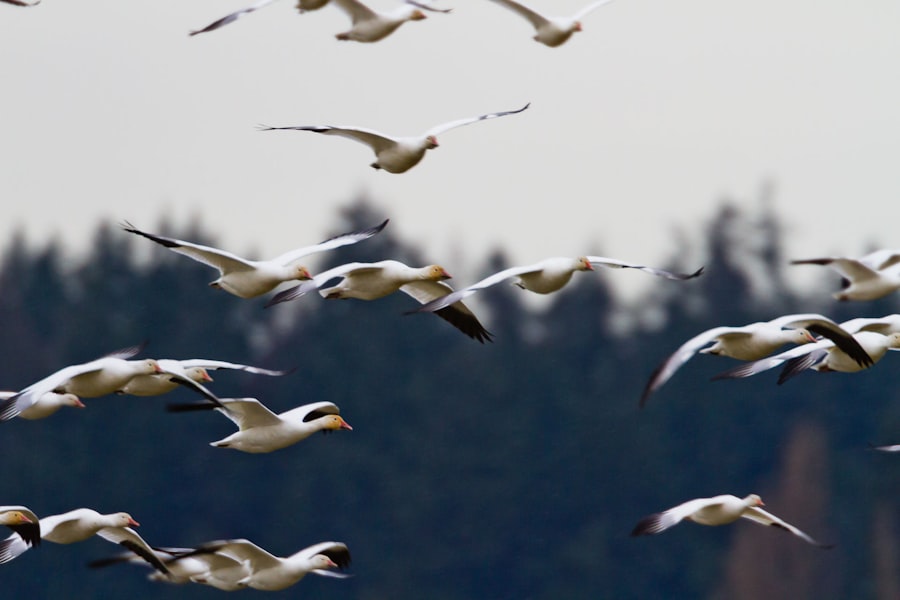
Sound-based repellents are another effective method for controlling geese populations. These devices emit sounds that mimic the distress calls of geese or other predator sounds. The idea is to create an environment that is perceived as unsafe by the geese, causing them to leave the area.
There are different types of sound-based repellents available, including handheld devices, motion-activated devices, and stationary devices. Handheld devices can be used to manually emit distress calls when geese are present. Motion-activated devices emit sounds when geese approach, while stationary devices continuously emit sounds to deter geese from entering an area.
Visual deterrents for geese
Visual deterrents can be highly effective in deterring geese from unwanted areas. These deterrents take advantage of the geese’s natural instincts and fear of predators. Some common visual deterrents include scarecrows, balloons with predator eyes painted on them, and fake predators like plastic owls or coyotes.
It is important to regularly move and rotate visual deterrents to prevent geese from becoming accustomed to them. Additionally, using a combination of different visual deterrents can increase their effectiveness.
Smell-based repellents for geese
Smell-based repellents can also be used to deter geese from certain areas. Geese have a strong sense of smell and are sensitive to certain scents. There are several types of smell-based repellents available, including sprays, granules, and oils.
Sprays can be applied to areas where geese are present, creating an unpleasant scent that deters them from returning. Granules can be spread on the ground or around the perimeter of an area to create a barrier that geese will avoid. Oils can be applied to surfaces or objects to create a scent that repels geese.
Geese control through habitat modification
Modifying the habitat can be an effective long-term solution for controlling geese populations. By making the area less attractive to geese, they will be less likely to return. Some examples of habitat modifications include removing or reducing food sources, such as grass or plants that geese feed on, and creating barriers around bodies of water to prevent geese from swimming or landing.
Additionally, reducing open spaces for nesting and roosting can discourage geese from staying in an area. This can be done by planting dense shrubs or tall grasses that make it difficult for geese to access these areas.
Professional geese control services
In some cases, it may be necessary to hire a professional geese control service to effectively manage a geese infestation. Professional services have the expertise and resources to implement a range of strategies tailored to the specific needs of the area. They can assess the situation, develop a comprehensive plan, and provide ongoing maintenance to ensure long-term geese control.
When considering hiring a professional geese control service, it is important to look for a company that has experience in geese management and uses humane methods. They should also have a good reputation and be licensed and insured.
Tips for preventing geese from returning
Once geese have been successfully deterred from an area, it is important to take steps to prevent them from returning. This can be done by regularly maintaining the area, removing any potential food sources, and implementing ongoing deterrent strategies.
Regularly inspecting the area for signs of geese activity and addressing any issues promptly can help prevent geese from returning. Additionally, educating others in the community about the importance of not feeding geese and properly disposing of food waste can help reduce the attractiveness of an area to geese.
Controlling geese populations is essential for maintaining a balance between human needs and wildlife preservation. There are various methods available for deterring geese from unwanted areas, including natural deterrents, physical barriers, scare tactics, sound-based repellents, visual deterrents, smell-based repellents, habitat modification, and professional geese control services. By understanding geese behavior and implementing effective strategies, it is possible to control geese populations in a humane and sustainable manner.
If you’re looking for effective ways to keep geese away from your property, you may also be interested in learning about how to provide a suitable coop for turkeys. Poultry Wizard offers a helpful article on the topic, which you can find here. Understanding the specific needs and requirements of turkeys can help you create a safe and secure environment that keeps them happy and protected.
FAQs
What are some natural ways to keep geese away?
Some natural ways to keep geese away include using decoys, planting certain types of vegetation, and using noise deterrents.
What are some man-made ways to keep geese away?
Some man-made ways to keep geese away include using physical barriers, such as fences or netting, and using chemical repellents.
Why do geese need to be kept away?
Geese can cause damage to property and pose a health risk due to their droppings. They can also be aggressive towards humans and other animals.
What are some common areas where geese are a problem?
Geese are often a problem in parks, golf courses, and other areas with bodies of water and open grassy areas.
Are there any laws regarding how to keep geese away?
There may be local laws or regulations regarding how to keep geese away, so it is important to check with your local government or wildlife agency before taking any action.
Meet Walter, the feathered-friend fanatic of Florida! Nestled in the sunshine state, Walter struts through life with his feathered companions, clucking his way to happiness. With a coop that’s fancier than a five-star hotel, he’s the Don Juan of the chicken world. When he’s not teaching his hens to do the cha-cha, you’ll find him in a heated debate with his prized rooster, Sir Clucks-a-Lot. Walter’s poultry passion is no yolk; he’s the sunny-side-up guy you never knew you needed in your flock of friends!

